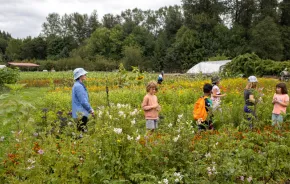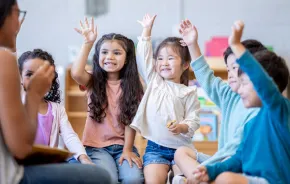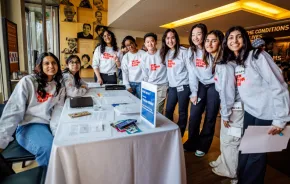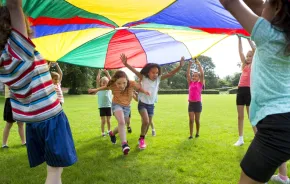
Editor's note: This article was sponsored by Laurel Springs School.
In the before times, kids forgot a lot over the summer. That’s why the first month or more of each new school year is all about reviewing previous material. But the summer slide has got nothing on the COVID-19 learning gap. Children who started kindergarten in 2019 will enter third grade this fall having never experienced a normal school year. The effects of three years of irregular schooling have widened equity gaps as some families formed supervised in-person pods while others struggled to obtain internet connections. Tens of thousands of students disappeared from the school system completely.
“You’re talking about two and a half years of spotty education, with [remote learning as] a Band-Aid approach that most schools haven’t figured out yet. Studies show these kids have missed foundational skills,” says Megan O’Reilly Palevich, head of school at the private online K–12 Laurel Springs School.
Summer school salvation
Virtually synonymous with “remedial learning,” summer school is an obvious solution. Many school districts only offer summer school to students who failed classes. That stigma can be hard to overcome, but summer school doesn’t have to feel like punishment. It doesn’t even have to be remedial.
Palevich notes a variety of other reasons families may choose summer school:
- Acceleration: A summer math or language course can help a student jump a subject level.
- More classes, more options: A student can explore electives, such as world languages, that aren’t offered at their school or that don’t fit in their school-year schedule; or take an extra AP course without overloading their school year.
- Making space: High school students can complete required coursework during summer to open up a free period during the school year for more time to study, focus on college applications or work part-time.
Remediation vs. acceleration
Even if your motive is to catch up on lost learning, new research shows that remediation — going all the way back to work that is easy and progressing from there — is not as helpful as acceleration.
“Acceleration doesn’t mean to treat your kid like Doogie Howser. It’s [about] putting kids in the developmentally appropriate class and extending their content,” says Palevich. Acceleration teaches at grade-level and stops to fill in missing underlying skills as they become necessary.
“When you put kids in a situation where they can rise to the occasion, they will rise. I strongly believe that kids should not be held back. If you can accelerate them to their current grade level, they are going to feel successful, and if you couple that with mastery-based learning, they are going to be able to catch up and speed ahead,” says Palevich.
She should know, since Laurel Springs School specializes in remote learning for kids whose education is often interrupted. The school was founded in 1991 as a distance learning school option to fill a niche for young professional performers, Olympics-bound athletes and other students for whom daily in-person school attendance was impractical.
Mastery-based learning
Laurel Springs has evolved alongside the technology to include lots of interactive activities and even a full calendar of interest-based clubs for its full-time students. But the biggest factor in the school’s success is not technology: It’s the mastery-based approach to teaching.
“It is our job to teach a child to learn and relearn. It’s very powerful to allow a student to fail, go talk to their teacher to get support, then go back and practice and try again. It’s not about the grade, it’s about the learning,” Palevich explains. In a remote, mastery-based curriculum, students move at their own pace. They don’t have to be “in school” for six hours if they can finish their work in three — which many students do outside of the rituals of a typical in-person school day.
When you don’t have to keep the whole class pacing along together, it takes the pressure off students who need more time to figure something out. But mastery-based learning may be even more beneficial when it lets kids speed up.
“Once average kids who maybe before were just skating along in the classroom go into self-paced mode, you watch them fly as they take ownership and control of their learning,” says Palevich.
Making remote work
For many families, remote learning was the problem, but for others it’s the solution. During the pandemic, enrollment at Laurel Springs boomed to more than 5,000 students around the world. When schools returned to in-person learning, more than half of the new students chose to stay online at Laurel Springs, and many public-school students are enrolling in the school’s remote summer courses to close up learning gaps resulting from the pandemic.
Palevich is proud that Laurel Springs’ remote curriculum is strong enough to attract students who have in-person options. But she cautions that remote learning isn’t right for every child. Remote schooling works best for engaged families, especially those with younger students.
“You have to be a partner in learning as a parent. When you send your kids off to a brick-and-mortar, you don’t see them for eight hours and just hope for the best. With remote learning, you can be a part of your child’s schooling. Parents see firsthand as their kids learn how to learn, be independent and develop self-advocacy skills — all those awesome things you don’t normally see,” says Palevich.
Parents can use incentives to keep kids on track during a summer program. But for the school year, especially as students grow older, kids need to be self-motivated to thrive online. Time management and self-advocacy are important skills that many traditional students don’t learn until high school or even college. But their development is baked into the online learning experience.
“Kids are so used to having things spoon-fed to them. You must be an active learner in any kind of distance learning because you have to choose to do your work,” says Palevich. “You have to make a schedule for your classes. But when kids start feeling success, they figure out these skills.”
Palevich says her own son learned next-level time management skills during a summer intensive course. On their vacation, he spent mornings on schoolwork and joined the family on the beach in the afternoon. A few weeks later, when he had a chance to travel with a friend, he chose to double up on schoolwork ahead of time so that he could enjoy the entire week off.
External factors can still make remote learning the most practical choice. Many families have discovered the freedom that comes from not having their housing options tied to your school district. Laurel Springs now has students whose families travel year-round; who have moved to Costa Rica or other far-flung destinations; and families who found their dream home in a suboptimal school district.
Let it slide
Summer school isn’t the only option for catching up. Palevich knows that a lot of important learning takes place outside of formal education.
“Try to involve school skills in everything you do. Bring learning into their everyday life,” Palevich recommends. Read the paper together and talk about the news. Go grocery shopping together and have them keep track of your budget as the cart fills. Have kids read about places you will visit on vacation and let them teach you about your destination. Help them pursue their passions — kids can learn all kinds of academic skills as they become experts in whatever captivates them. “It’s about engaging that critical thinking piece of their brain on a daily basis,” says Palevich.
And remember that, just like adults, kids are dealing with a lot these days. If summer school makes you and your child feel more confident heading into the next school year, it can be a great choice. But it’s also okay to skip the Khan Academy and workbooks in favor of a carefree summer riding bikes and swimming. It’s not the end of the world if your child takes a little longer to learn long division or your high schooler takes a gap year.
It’s natural for parents to worry about their kids’ progress. But just as our toddlers eventually completed toilet training, our students will learn on their own timeline.
“Kids will learn to read and write and do math. They may not learn calculus, but they will get there,” Palevich says. “I think it’s important for parents to have grace with their children. We should not force kids into doing things that they’re not ready for. Focus on helping your kid be a happy person.”
|
Sponsored by: |












